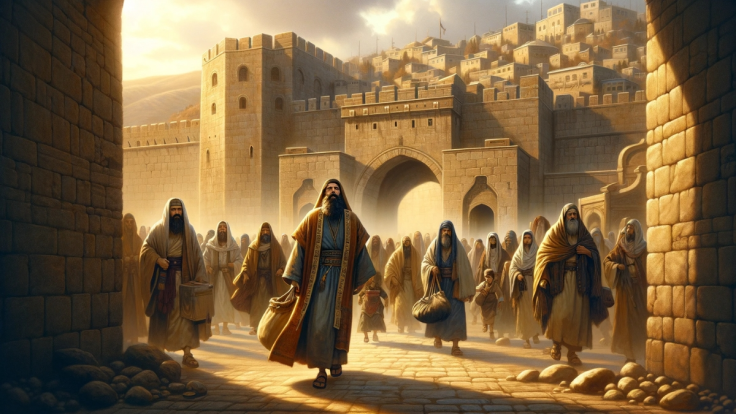The Book of Ezra, from a Hebraic perspective, recounts the return of the Jewish exiles from Babylon to Jerusalem and the rebuilding of the Temple after the Babylonian exile. It emphasizes themes of restoration, covenant faithfulness, and the importance of worship.
Summary of the Book of Ezra
- Return from Exile (Chapters 1-2): The book opens with King Cyrus of Persia issuing a decree allowing the Israelites to return to Jerusalem and rebuild the Temple. This marks the fulfillment of prophetic promises. A remnant of about 50,000 people returns, led by Zerubbabel.
- Rebuilding the Temple (Chapters 3-6): The returned exiles begin to rebuild the Temple amidst opposition. Despite challenges, they lay the foundation and eventually complete the Temple, celebrating its dedication.
- Ezra’s Arrival (Chapters 7-10): Ezra, a scribe and priest, arrives in Jerusalem with a second wave of exiles. He is tasked with teaching the Law of God and reforming the community. His deep commitment to the Torah and the spiritual well-being of the people is highlighted.
God’s Good Hand on Ezra (Chapter 7)
In Ezra 7:6, it states that “the good hand of his God was upon him.” This phrase signifies divine favor, guidance, and support. From a Hebraic perspective, it implies:
- Divine Assistance: Ezra’s successful journey and mission were attributed to God’s intervention and blessing. This reflects the belief that success in endeavors is often seen as a sign of God’s favor.
- Moral and Spiritual Authority: Ezra’s character and dedication to studying and teaching the Law contributed to this divine favor. His commitment to God’s commandments positioned him as a leader worthy of God’s support.
- Community Restoration: The good hand of God on Ezra also underscores the broader theme of restoration for the Jewish community, indicating that God was actively involved in renewing His covenant people.
Overall, the Book of Ezra emphasizes the restoration of Israel’s identity and worship through God’s faithful guidance and the leadership of dedicated individuals like Ezra.
It’s important to recognize that opposition is inevitable when you are building or advancing the Kingdom of God. It’s simply a part of the journey.
Ezra’s opposition
Ezra faced several specific challenges upon his arrival in Jerusalem:
- Opposition from Local Authorities: Ezra encountered resistance from local leaders and neighboring peoples who were hostile to the return of the exiles and the rebuilding efforts. This included attempts to disrupt their work and undermine their authority.
- Spiritual and Moral Decline: Upon arriving, Ezra discovered that many of the returned exiles had intermarried with foreign peoples, violating the Torah’s commandments. This posed a significant challenge in maintaining the community’s spiritual integrity and identity.
- Lack of Knowledge of the Law: Many of the people were not well-versed in the Law of God. This lack of understanding necessitated Ezra’s role as a teacher and reformer to educate the community about their heritage and responsibilities.
- Restoration of Worship: Reestablishing proper worship practices and Temple rituals after years of disuse was a daunting task, requiring both physical and spiritual renewal.
- Cultural Assimilation Pressures: The returned exiles faced pressures to assimilate into the surrounding cultures and practices, which threatened their distinct identity as the covenant people of God.
- Logistical Challenges: Managing the logistics of the return, including securing resources, organizing the community, and ensuring the Temple’s restoration, added to Ezra’s difficulties.
These challenges highlighted the need for strong leadership and commitment to God’s Law, central to Ezra’s mission in Jerusalem.
Here are some key themes to highlight about Ezra’s life in the summary:
- Faithfulness to God’s Law: Ezra’s deep commitment to studying, teaching, and living according to the Torah emphasizes the importance of spiritual integrity.
- Leadership and Influence: Ezra serves as a model leader, guiding the community in their return to Jerusalem and helping them restore their identity and practices.
- Restoration of Worship: His efforts to reestablish proper worship in the Temple highlight the significance of communal worship in restoring the covenant relationship with God.
- Covenant Renewal: Ezra’s leadership in leading the people to confess their sins and renew their commitment to God underscores the theme of repentance and spiritual revival.
- Community Involvement: The importance of collective effort in rebuilding the community is evident, showcasing how unity and cooperation are vital for restoration.
- Divine Favor: The phrase “the good hand of his God was upon him” illustrates the theme of divine assistance in fulfilling God’s purposes.
These themes collectively reflect Ezra’s pivotal role in the spiritual and physical restoration of the Jewish community after the exile.
